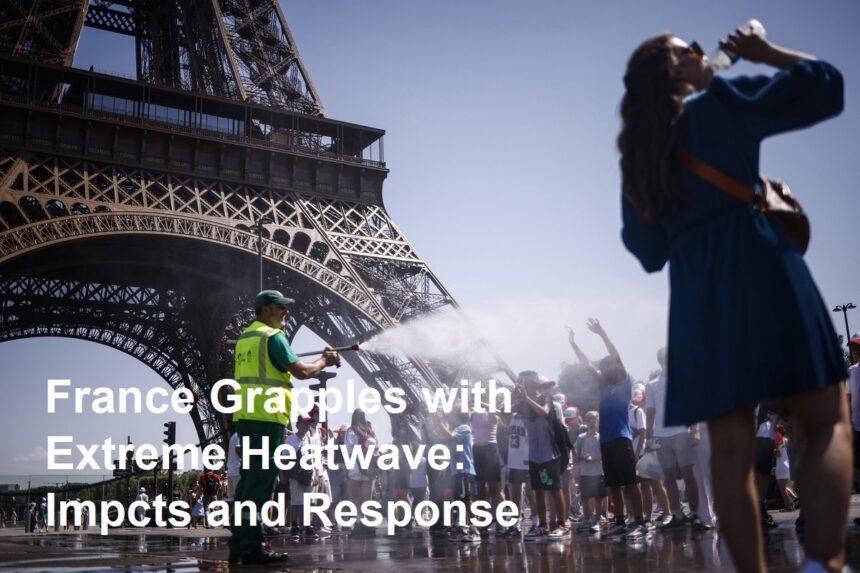Introduction
In the heat of summer 2025, France has found itself at the epicenter of a severe and prolonged heatwave, breaking records and raising urgent questions about climate resilience. Cities across the country, from Paris to Marseille, have been sweltering under relentless temperatures soaring well above seasonal averages. This extreme weather is more than just a discomfort—it’s a stark reminder of the escalating impact of global climate change on daily life, infrastructure, and public health.
The Scope and Scale of the Heatwave
Throughout June and into early July, meteorological services reported unprecedented daily highs, with some regions reaching temperatures of 42°C (108°F). Notably, the city of Lyon experienced its hottest week in recorded history, prompting the closure of schools and public offices, while hospitals in Toulouse and Bordeaux admitted more patients suffering from heatstroke and dehydration. The French national weather agency, Météo-France, issued red alerts across several departments, urging the public to stay indoors during peak hours and drink ample water.
Impact on Public Health and Everyday Life
As the mercury climbed, so did incidents related to heat stress. Emergency services recorded a spike in calls for respiratory and cardiovascular emergencies, particularly among the elderly, children, and those with pre-existing health conditions. Reports of power outages also increased as air conditioning units and fans strained the electrical grid. Municipal authorities responded by opening “cooling centers” in libraries, community halls, and sports complexes, providing refuge for those unable to find relief at home.
In addition to the health crisis, the heatwave disrupted daily routines. Outdoor sports and cultural events were postponed or canceled, while the urban heat island effect turned city centers into virtual furnaces after sunset. Many Parisians sought respite at public fountains and along the banks of the Seine, although safety concerns about water quality persisted. Rural communities were hit hard as well, with agricultural yields threatened by drought and livestock at risk from heat stress.
Environmental and Economic Concerns
France’s energy infrastructure, already under strain due to increased demand, faced further complications as nuclear power plants along major rivers struggled to operate efficiently with rising water temperatures. Hydroelectric reservoirs reported historic lows, reducing output just as consumption peaked. Farmers in the wine regions of Bordeaux and Champagne expressed alarm at accelerated grape ripening and the risk of crop loss. The tourism sector, typically vibrant in summer, also braced for lower visitor numbers as travel advisories warned of hazardous conditions.
Government Response and Policy Measures
Recognizing the gravity of the crisis, French authorities rolled out emergency measures to mitigate the impact. Public information campaigns promoted hydration and awareness, while restrictions were placed on outdoor work during midday hours for vulnerable occupations. Firefighters were put on high alert to combat the increased risk of wildfires, particularly in the Mediterranean coast and central forests. Meanwhile, regional governments distributed water and portable fans to the most affected populations, especially in crowded urban neighborhoods.
President Emmanuel Macron addressed the nation, linking the heatwave directly to climate change and emphasizing the need for long-term adaptation strategies. He called for greater investment in green infrastructure—such as tree-planting initiatives in cities, improved home insulation, and renewable energy—to build resilience against future heatwaves. Environmental advocates pushed for stricter emissions targets, warning that extreme weather events are likely to become more frequent and intense without urgent action.
The Way Forward: Lessons and Reflections
As France continues to grapple with the present crisis, conversations are shifting toward preparing for a future shaped by climatic extremes. Urban planners and health officials are reassessing emergency protocols and updating building codes to better withstand high temperatures. On the individual level, public awareness of heat safety is growing, with a collective realization that adaptation—both societal and personal—is no longer optional.
The heatwave of 2025 stands as a sobering chapter in France’s history, underscoring the intertwined challenges of public health, environmental stewardship, and climate adaptation. How the country responds in the coming months will serve as a bellwether not just for Europe, but for nations worldwide facing an increasingly volatile planet.












